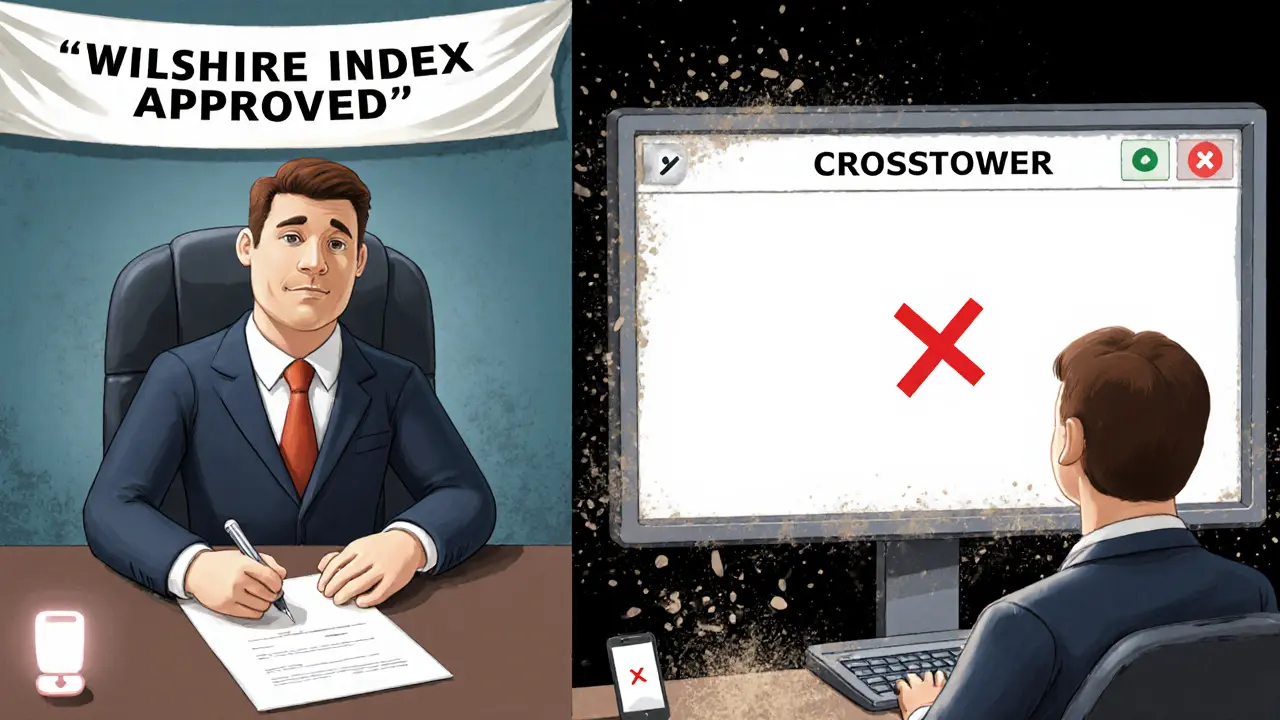CrossTower Crypto Exchange Review: Institutional Ambitions and Retail Reality in 2025
 Nov, 23 2025
Nov, 23 2025
CrossTower Exchange Comparison Tool
Compare CrossTower with leading crypto exchanges to determine which platform best fits your needs. Based on data from the article, CrossTower was removed from Wilshire Indexes due to low trading volume and failed institutional credibility. This tool helps you evaluate exchanges based on real metrics.
Results
Select your preferences and click "Compare Exchanges" to see results.
When you hear the name CrossTower, you might think of a solid crypto exchange built for serious traders. But the reality is more complicated. CrossTower launched in 2020 with big goals: to bring institutional-grade trading tools to crypto and make digital assets feel as normal as stocks. It had the pedigree - founders from Citadel and Deutsche Bank, a license from Bermuda’s financial regulator, and a $6 million seed round. But by 2023, something broke. And today, in late 2025, CrossTower isn’t just struggling - it’s fading from view.
What CrossTower Actually Offered
CrossTower wasn’t trying to be Binance or Coinbase. It didn’t push meme coins or flashy mobile apps. Instead, it focused on one thing: serving institutional clients. Think hedge funds, family offices, and asset managers with $50 million to $500 million in crypto holdings. Its capital markets desk offered things most retail exchanges don’t: trade financing, structured products, and multi-venue execution. Greg Bunn, ex-Citadel, called it a “prime brokerage for crypto.” That meant clients could borrow digital assets, hedge positions, and get executed across multiple exchanges without juggling accounts. For retail users, CrossTower had a basic spot exchange. You could deposit USD via wire transfer or credit card. You could trade Bitcoin, Ethereum, and a few other major coins. There was a mobile app on both iOS and Android. It looked clean. It was simple. But that was it. No staking, no NFT marketplace, no futures trading. No leveraged tokens. No API for advanced traders. If you were a beginner looking to buy your first Bitcoin, CrossTower worked. But it didn’t give you anything extra.The Fee Structure That Looked Too Good to Be True
One of CrossTower’s biggest selling points was its trading fees. Market makers paid just 0.05%. Market takers? 0.00%. That’s right - zero fees for buying or selling at the current price. It sounded like a gift. And for a while, it worked. Traders flocked to the platform to take advantage of the free taker fees, especially on high-volume pairs like BTC/USD. But here’s what they didn’t tell you: those zero fees only worked because CrossTower was losing money on every trade. It was subsidizing volume to attract liquidity. And liquidity is everything in crypto. Without deep order books, your big orders get slippage. Your stop-losses get skipped. Your trades don’t fill. CrossTower’s fee model was a trap. It looked generous, but it was a sign the exchange couldn’t sustain itself without burning cash.Why Wilshire Indexes Dropped CrossTower
The biggest blow came on May 4, 2023. Wilshire Indexes - the same firm that powers the FT Wilshire Digital Asset Index Series - removed CrossTower as a contributing exchange. Why? Because it failed two consecutive reviews. The criteria? Trading volume, order book depth, price transparency, and resistance to manipulation. CrossTower didn’t just fall short - it was invisible. Think of it this way: if you’re trying to build a stock index based on real market prices, you need exchanges that actually trade. If an exchange’s volume is too low, its prices aren’t reliable. Wilshire doesn’t care if you have a license. They care if your order book has buyers and sellers at realistic prices. CrossTower didn’t. That’s why exchanges like Coinbase, Kraken, and Bitstamp stayed on the list. CrossTower didn’t. And that wasn’t a minor setback. It was a death sentence for institutional credibility.
Low Retail Pull, High Regulatory Cost
CrossTower was called a “regulation-driven exchange with low retail pull.” That’s not a compliment. It means the team spent more time getting licenses than building features. They got Bermuda’s approval in October 2020 - a solid regulatory move. But Bermuda isn’t the EU or the U.S. It’s a small island. And regulators there don’t have the same scrutiny as the SEC or FCA. So while CrossTower checked the compliance box, it didn’t win trust from serious investors. Retail users didn’t stick around. Why? Because there was nothing to keep them. No rewards program. No educational content. No community. No referral bonuses that actually paid out in meaningful ways. Sure, they offered a 25% commission on referred users’ trading fees. But if no one’s trading, no one’s earning. The referral program was a ghost.The Comparison No One Talks About
CrossTower tried to sit between retail and institutional. But it ended up stuck in the middle. Here’s how it stacks up against the real players:| Feature | CrossTower | Coinbase | Kraken | Bitstamp |
|---|---|---|---|---|
| Institutional License | Bermuda Monetary Authority | US State Licenses + FinCEN | US State Licenses + FinCEN | EU License (Luxembourg) |
| Trading Fees (Taker) | 0.00% | 0.50% (standard) | 0.16% (standard) | 0.25% |
| Spot Trading Pairs | ~20 | 200+ | 150+ | 80+ |
| Mobile App | Yes | Yes | Yes | Yes |
| Fiat On-Ramp | Wire, Credit Card | Bank Transfer, Card, PayPal | Bank Transfer, Card | Bank Transfer |
| Wilshire Index Status | Removed (May 2023) | Active Contributor | Active Contributor | Active Contributor |
| Trading Volume (Daily) | Undisclosed, likely <$10M | $2B+ | $500M+ | $300M+ |
CrossTower’s numbers don’t lie. It didn’t just lose to the big players. It disappeared from the conversation. While Coinbase handles billions in daily volume, CrossTower’s trading activity was so low that Wilshire couldn’t even use its data to calculate an index price.
Is CrossTower Still Operating in 2025?
That’s the question everyone’s asking. The last major update from CrossTower was in early 2023. No new features. No press releases. No hiring announcements. By January 2024, The Royal Gazette called it the “latest crypto casualty.” That’s not a neutral term. It’s a eulogy. The website still loads. The mobile apps still exist. But if you try to deposit USD now, you’ll likely get an error. Customer support emails go unanswered. The referral program? Still listed on the site - but no one’s earning from it. This isn’t a platform in maintenance mode. This is a platform that shut down quietly. No fanfare. No announcement. Just silence.
What You Should Do If You’re Still Using CrossTower
If you still have funds on CrossTower, move them. Now. Don’t wait. There’s no guarantee the platform will stay online. There’s no insurance. No FDIC. No regulatory protection. You’re holding assets on a service that lost institutional credibility, vanished from public view, and stopped responding to users. Transfer your crypto to a wallet you control. Use a reputable exchange like Kraken or Coinbase to sell or move your assets. If you’re holding USD on CrossTower, you’re out of luck. Fiat withdrawals were already slow before the collapse. Now? They’re gone.Why CrossTower Failed
CrossTower didn’t fail because it was bad. It failed because it tried to do too much, too late, without enough fuel. It tried to compete with Coinbase on regulation - but didn’t have the legal team to scale. It tried to compete with Binance on features - but never built them. It tried to compete with institutional giants like Genesis - but didn’t have the capital to subsidize liquidity. It had the right idea: bring Wall Street to crypto. But Wall Street doesn’t play with startups. It waits for proven players. And CrossTower never proved anything.Final Verdict
CrossTower was a bold experiment. It had smart people. It had a license. It had a plan. But in crypto, plans mean nothing without volume, trust, and execution. CrossTower had none of those by 2023. Today, in 2025, it’s a ghost. If you’re looking for a crypto exchange, don’t waste time on CrossTower. It’s not just outdated - it’s gone. The lessons here aren’t about technology. They’re about sustainability. You can’t build a crypto exchange on zero fees and regulatory paperwork. You need real users. Real volume. Real trust. CrossTower had none of that. Don’t be the next person holding assets on a platform that vanished overnight.Is CrossTower still operational in 2025?
CrossTower’s website and apps still load, but the platform is effectively inactive. Customer support is unresponsive, fiat deposits no longer work, and trading volumes have collapsed. There have been no official updates since early 2023. The Royal Gazette referred to it as the "latest crypto casualty" in January 2024, suggesting it has ceased meaningful operations.
Why was CrossTower removed from Wilshire Indexes?
CrossTower was removed from the FT Wilshire Digital Asset Index Series in May 2023 after failing two consecutive semi-annual reviews. The index provider uses CC Data’s Exchange Benchmark, which measures trading volume, order book depth, price transparency, and resistance to manipulation. CrossTower’s trading activity was too low to provide reliable pricing data, making it unfit for institutional index inclusion.
Did CrossTower have good security?
CrossTower claimed to use standard security practices like cold storage and two-factor authentication. But without public audits or transparency reports, there’s no way to verify these claims. After its decline, no user reports or third-party security assessments were published. The lack of activity makes any security claims unverifiable.
Can I still withdraw my funds from CrossTower?
Withdrawals are extremely unlikely to work. Users reported delays and failed transactions as early as mid-2023. Since then, no verified withdrawals have been confirmed. If you have funds on CrossTower, assume they are inaccessible. Move them to a personal wallet or a functioning exchange immediately.
What were CrossTower’s trading fees?
CrossTower advertised 0.05% for market makers and 0.00% for market takers. While this looked attractive, it was unsustainable. The exchange lost money on every trade to attract volume. This strategy worked briefly but collapsed when trading activity didn’t grow. The zero-fee model was a red flag - not a benefit.
Was CrossTower regulated?
Yes, CrossTower held an operational license from the Bermuda Monetary Authority, obtained in October 2020. This made it one of the few crypto exchanges with formal regulatory approval at the time. However, regulatory status doesn’t guarantee safety or sustainability. Many licensed exchanges have failed due to poor operations or low volume - CrossTower was one of them.
Who was CrossTower’s target audience?
CrossTower targeted institutional clients - hedge funds, asset managers, and family offices with $50 million to $500 million in assets. It offered prime brokerage services like trade financing and structured products. Retail users were an afterthought. The platform offered basic spot trading and fiat on-ramps, but lacked features or support to retain them.
What happened to CrossTower’s referral program?
CrossTower offered a 25% commission on trading fees generated by referred users - in perpetuity. But with trading volume collapsing and users disappearing, no one earned meaningful commissions. The program still appears on its website, but it’s inactive. It was a marketing tool that outlived its purpose.
Sam Daily
November 26, 2025 AT 19:28Bro, I had $15k in CrossTower back in 2022. Thought I was smart for avoiding Coinbase fees. Zero taker fees? Sign me up! 🤑 Turns out it was like buying a Lamborghini with no gas tank-looks cool until you hit the highway. Moved everything to Kraken last year. Still can’t believe I didn’t cash out sooner. RIP my sanity.
Wilma Inmenzo
November 27, 2025 AT 05:13WAKE UP SHEEPLE!! CrossTower didn’t fail-it was TAKEN DOWN. Wilshire? Controlled by the same banks that hate crypto. The zero fees? That’s why they erased it. They don’t want decentralized liquidity-they want you on their platforms with 0.5% fees and surveillance. This is a cover-up. 🕵️♀️💸
priyanka subbaraj
November 28, 2025 AT 21:28I cried when I saw the withdrawal error. Not because of the money. But because I trusted them. I believed in their ‘institutional’ vibe. I thought they were different. Turns out, they were just another pretty lie. 💔
George Kakosouris
November 30, 2025 AT 05:51Let’s be real: CrossTower was a boutique liquidity pump masquerading as prime brokerage. The 0.00% taker fee was a liquidity subsidy disguised as customer generosity-classic capital misallocation. They had zero operational leverage, no market depth, and their order book was thinner than a VC’s pitch deck. When Wilshire dropped them? That wasn’t a review failure-it was an arbitrage opportunity for the smart money to exit. The real tragedy? They thought compliance = moat. Nope. Volume is the only moat that matters in crypto.
Tony spart
November 30, 2025 AT 23:51USA made the best exchanges. Kraken, Coinbase-they got the grit. CrossTower? Some Bermuda shell game. You think some island license makes you legit? LOL. We don’t need crypto from places where the main export is sunscreen and bad wifi. If you’re holding crypto on CrossTower, you’re not a trader-you’re a tourist who got lost in the airport.
Ben Costlee
December 2, 2025 AT 13:14I just want to say to anyone still holding funds on CrossTower: you’re not alone. I’ve been there. I thought ‘they’re regulated, so they’re safe.’ I was wrong. But here’s the truth-you’re not stupid for trusting. The system made it look safe. What matters now is your next move. Don’t panic. Don’t blame yourself. Just move it. One step. One wallet. One breath. You’ve got this. 🙏
Mark Adelmann
December 2, 2025 AT 20:25Man, I remember when CrossTower was the cool kid on the block. Clean UI, no BS, zero fees. Felt like the anti-Coinbase. Then one day… poof. No updates. No replies. Just a website that still loads like a ghost haunting its own obituary. 😔 If you’re reading this and still have funds there-please, just move them. No drama. Just do it. Your future self will thank you.
ola frank
December 4, 2025 AT 00:29The structural failure of CrossTower lies in its misalignment of incentive architecture. Regulatory compliance, while necessary, is a cost center-not a revenue driver. The absence of network effects, coupled with an unsustainable subsidy model for liquidity provision, created a negative feedback loop: low volume → low credibility → reduced institutional participation → further volume contraction. Wilshire’s removal was not a symptom but a terminal diagnosis. The platform’s inability to transition from a subsidized prototype to a self-sustaining market-making entity reveals a fundamental misunderstanding of crypto’s economic primitives: trust is derived from liquidity, not licensing. The Bermuda license conferred legitimacy, but not viability.